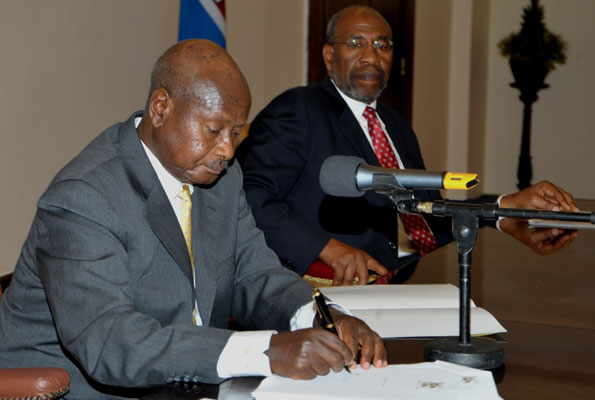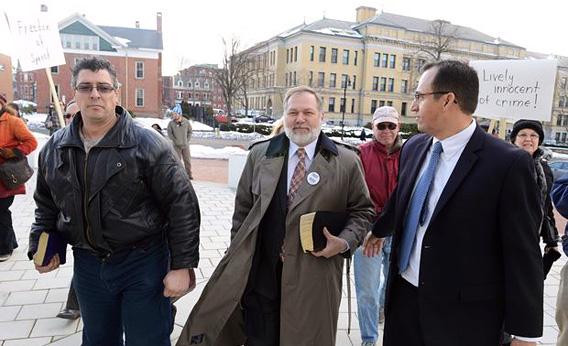On Monday, February 24th, the President of Uganda, Yoweri Museveni signed the now infamous anti-homosexuality bill into law. Although homosexual acts were already illegal in the country, the law officially sentences any people convicted of sodomy, same-sex marriage, or even promotion of homosexuality (such as LGBTQ activists who encourage people to come out) to life imprisonment. Noticeably, this piece of legislation includes lesbians in the indictment for the first time.
Interestingly, Ugandan lawmakers have watered down some provisions of the law. The anti-homosexuality bill previously proposed a sentence of up to 14 years for first-time offenders and also made it a crime to not report anyone whose heterosexuality is suspect. This legal distinction would have made it impossible to be openly gay. However, even without a clause demanding that citizens report any queer members of their communities, LGBTQ folks in Uganda now face an even more dangerous and fearsome epoch in their nation’s history. A press statement reviewing U.N. Ambassador Samantha Power’s meeting with the Director of Sexual Minorities, Frank Mugisha mentions that “the recent publication of a list of the country’s “200 top” homosexuals… raised concerns for the safety of LGBT individuals inside Uganda.”

via Daily Monitor
The United States has wasted no time responding to President Museveni’s actions. In a statement issued the same day as the law’s initiation, Secretary of State John Kerry condemned Ugandan lawmakers’ decision.
The United States is deeply disappointed in the enactment of the Anti-Homosexuality Bill in Uganda. For the four years since the bill was introduced, we have been crystal clear that it blatantly violates human rights obligations that Uganda’s Human Rights Commission itself has recognized are enshrined in Uganda’s Constitution. Today’s signing threatens a dangerous slide backward in Uganda’s commitment to protecting the human rights of its people and a serious threat to the LGBT community in Uganda. We are also deeply concerned about the law’s potential to set back public health efforts in Uganda, including those to address HIV/AIDS, which must be conducted in a non-discriminatory manner in order to be effective.
The United States has already begun examining its relationship to the Ugandan Government, with whispers about this new law compromising the U.S. aid budget to Uganda. In the press statement, Secretary Kerry concluded, “From Nigeria to Russia and Uganda, we are working globally to promote and protect the human rights of all persons. The United States will continue to stand against any efforts to marginalize, criminalize, and penalize vulnerable persons in any society.”
President Museveni’s actions may be a direct response to Western leaders who have criticized Ugandan policies. Ofwono Opondo, a Ugandan government spokesperson, asserted that President Museveni signed the anti-homosexuality bill into law “with the full witness of the international media to demonstrate Uganda’s independence in the face of Western pressure and provocation.” President Museveni himself also attacked the way the U.S. has initiated more of a diatribe than a dialogue by insisting, “[we] “never seek to impose our view on others; if only they could let us alone.”
The speed and intensity with which anti-gay sentiments have influenced Ugandan politics seriously brings attention not only to the United States’ imperialist methods of condemning certain countries for “backwards politics” without examining how backwards U.S. politics can be, but also to the influence of the U.S. evangelical right, who has played a significant role in implanting homophobic sentiments in Ugandan communities and has advocated for the incorporation of legal measures that would threaten “homosexual activity” within the country. Most notable is Scott Lively, a U.S. evangelical who delivered a neo-colonial white saviorist address at an anti-gay conference in Kampala, Uganda in March of 2009 that he deemed his “nuclear bomb against the gay agenda in Uganda.” Lively also discussed legislation that would target LGBTQ peoples in Uganda, and called the LGBTQ movement “an evil institution [whose] goal is to defeat the marriage-based society and replace it with a culture of sexual promiscuity in which there’s no restrictions on sexual conduct except the principle of mutual choice.” Cool guy.

via Slate
Lively and his Abiding Truth Ministry, as well as his Defend the Family Ministry, have a legacy of preaching anti-LGBTQ rhetoric in Uganda as far back as 2002, as described in a comic by Andy Warner about Lively’s hate speech. While conservative Christian groups in the United States have not issued many public statements about Uganda’s new law, Lively did choose to comment:
“I would rather the Ugandans had followed the Russian anti-propaganda model which reflects my philosophy of preventing the mainstreaming of homosexuality with the minimum limitation on personal liberties for those who choose to live discretely outside the mainstream.”
Thanks for clearing that up for us.
In August of 2013, an Atlanta federal judge permitted Ugandan LGBTQ activists to proceed with a lawsuit against Lively, an act that may serve at least to dissuade U.S. evangelicals from imposing their hate rhetoric abroad if not punish them. Still, the fate of LGBTQ Ugandans hangs in the balance as the country comes to term with this new piece of legislation.







